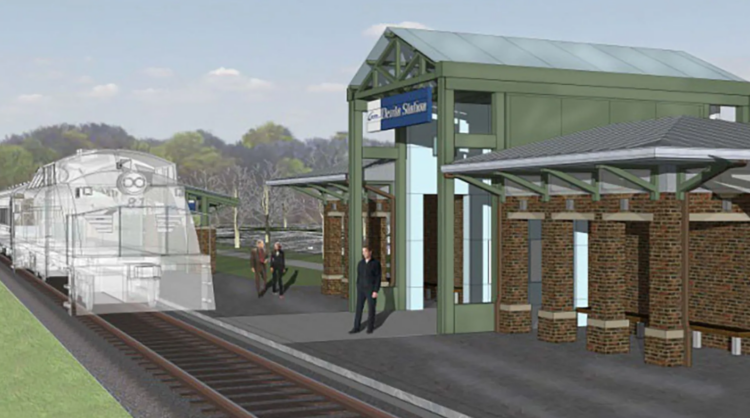
Rendering: CATS
NC Rep. Tricia Cotham has filed a transit bill in Raleigh that would pave the way for a 1-cent sales tax increase would support both road improvements and public transit projects.
House Bill 948, also known as The P.A.V.E. Act, would earmark 40 percent of the revenue from a new 1-cent sales tax increase for roads and 60 percent for public transit projects, including the proposed Red Line Commuter Rail from Uptown Charlotte to Huntersville, Cornelius and Davidson, potentially extending to Mount Mourne.
The managers of Mecklenburg County, the City of Charlotte, and the towns of Cornelius, Davidson, Huntersville, Mint Hill and Pineville, praised Cotham for filing HB 948/P.A.V.E.

Tricia Cotham
The tax and spending plan are being pitched for a 2025 referendum that would seek approval for a tax hike that, if passed, would generate $19.4 billion over 30 years for road and transportation projects.
Quotable
“It’ll bring real improvements that folks will feel right away. Cornelius has been speaking up loud and clear for better road funding, and the PAVE Act makes sure every town in the county gets its fair share,” said Cornelius Mayor Woody Washam.
Concerns

Mayor Washam
While proponents say the tax means a better future for North Mecklenburg, there are concerns.
The new cost estimate for the CATS Red Line is $1.38 billion—more than twice the original $640 million estimated pricetag.
And projections around ridership are hard to come by. The Charlotte Area Transit System acknowledged that it didn’t create ridership projections before a presentation on its transit expansion plans.
Official ridership estimates were too low for federal funding.
Real estate angle

Kurt Naas
Kurt Naas is a former member of the Cornelius Board of Commissioners and the founder of WidenI-77, a grassroots effort that opposed private toll lanes on I-77.
He said the promise of high-density development along the route similar to what happened with the Blue Line in South End may be whaaat’s driving the Red Line push.
Naas said: “Do we really want high-rise apartments in Cornelius? Do we really need to give developers additional incentive to build?”






Just Say No, if we have a say at all, to the Red Line. We pay 1 percent more (again) to something that will not be here for 10 years and probably more expensive than they say. So another 1 percent will need to be voted on. Nothing happened when they did this 20 years ago.
Posted by TC | April 11, 2025, 3:09 pm$0.01 not 1 percent k
Posted by Can’t read | April 11, 2025, 8:54 pmRidership is too low to qualify for Federal Funding….. that says all you need to know about this project. If this makes it to the ballot in November I hope the citizens of Mecklenburg County vote no.
Posted by Mike | April 12, 2025, 5:44 pmWe need more widening of roads not a train that most of our residents will not ride. We should also stop building more apartments until we can handle the current gridlock.
Posted by EB | April 11, 2025, 5:09 pmDo we really need passenger rail today or in the next 30 years to connect North Meck to Charlotte? Why can’t new local transportation dollars be spent with more flexibility to better adjust to population growth and resident preferences?
One example: the future will have driverless cars. Driverless cars are already operating in Phoenix and San Francisco and will be in Atlanta very soon. Some North Meck residents will likely choose driverless cars over commuter rail because of the flexibility – unlike rail the cars will operate 24/7, they will go door-to-door, and they will more easily permit the rider to work or conduct personal business while in transit. Could driverless cars run by the transit authority or a commercial operator access the I-77 express lanes at a different toll rate than a private vehicle owner must pay? If so, wouldn’t this save money and be a preferred option for travelers?
Another example: some commuters from exurbs already use the express bus. The express bus park n ride is easier to access from I 77 than the proposed commuter rail. North Meck could expand express bus service and connect that more directly to light rail and Amtrak.
The legislation expanding local sales tax authority should allow local government to have more flexibility with where to spend the new transportation dollars. If our local government believes we need to spend a lot now to get rail where the future demand is then that should be the focus. But, if the evidence from driverless cars and public micro transit shows door-to-door is what Meck residents want, then local government should have the flexibility to put the transit money into new initiatives like Micro and into making sure the roads are in good repair.
Also, any new local transportation tax should automatically sunset once a transportation spending target is reached or some period of time has passed, whichever is sooner. Each new sales tax should not be permanent.
Finally – once this money is raised, will the board of commissioners be primarily accountable for how it is spent? Or will they block grant the funds to boards, towns, and cities?
Posted by Josh F | April 12, 2025, 10:44 am